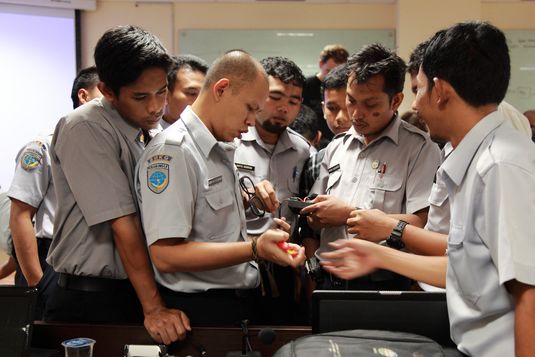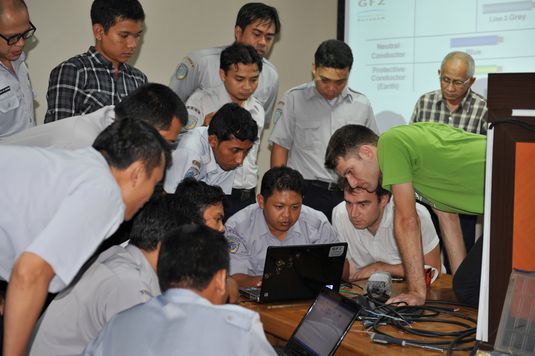PROTECTS was part of the follow-up concept for the GITEWS project and aimed to support the operator of the Indonesian Tsunami Early Warning System BMKG and its partners in the initial phase of operation through education, training and scientific advice. The 34-month project was funded by the BMBF with € 7.2 million.
This Capacity Development was further developed and broadly established for sustainable success of the early warning system in Indonesia. In the PROTECTS project, together with the newly established Indonesian Disaster Management Authority BNPB, the strategies and measures that were developed in the test region were applied throughout the country in cooperation with the Indonesian Academy of Sciences LIPI.
Furthermore, scientists and engineers from the warning centre were put through intensive and extensive training about the warning system, its operation and its maintenance.
The training and advanced training of personnel and the development of structural measures was based on three different pillars, right from the start:
1) Conducting a doctorate student programme. A total of 11 doctorate students from various countries bordering the Indian Ocean were trained in Germany during the period from 2007 to 2011;
2) Regular "Seismic Hazard Assessment and Tsunami Early Warning" training courses were conducted for scientists and engineers during the period from 2006 to 2013;
3) Advanced training of engineers and scientists of the partner institutions in operation and maintenance of the systems;
4) On a national level, training courses, round tables and advanced training courses were conducted for ministers and administrations (time period 2006 to 2010);
5) Measures for the extensive development and strengthening of the organisational structures and skills of the partners were given significant attention, so that they can react effectively in the event of an earthquake and a tsunami alert and can bring the people in the affected regions to safety. From 2006 to 2010, the programme was implemented in three pilot regions: Padang (large city in West Sumatra), Cilacap, Kebumen and Bantul (three districts in the more rural region in South Java) and Denpasar (tourism centre on Bali). In a continuous advisory process, the GIZ developed and tested standard procedures for decision-making in disaster alerts, processes and technologies for dissemination of the warning alert, as well as evacuation plans, together with its partners, at the local level. Furthermore, the project supported the Indonesian authorities and civilian organisations with public relations campaigns, the production and provision of educating materials, the performance of disaster drills and the advanced training of the staff of local disaster protection authorities. In Bali, the project was also involved in the development of procedures for tsunami prevention in the tourism sector.
The results of the GITEWS pilot phase were made available throughout the country in the subsequent PROTECTS project in an "up-scaling" process. Within the context of this, the training programme was developed and conducted, as well as the advisory of local decision-makers with the establishment of local disaster management structure and with the development of strategies for disaster prevention. Furthermore, the development of measures, regulations and technical guidelines initiated at the local and national level under GITEWS in cooperation with the newly established Indonesian disaster prevention authority BNPB was continued, which lead to the implementation of the warning alerts into practical protective actions. During recent years, Indonesia also used its own resources to further improve the disaster training of the population and the dissemination of the warning alerts.
Contact:
Daniel Acksel
Helmholtz Centre Potsdam
GFZ German Research Centre for Geosciences
Phone: +49-331-288-1078
Email: daniel.acksel@gfz-potsdam.de

